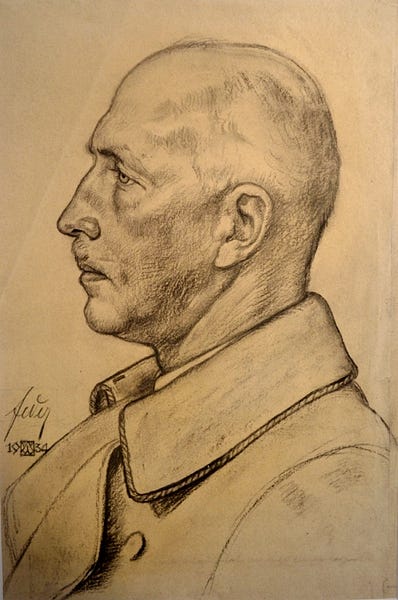Feder: The Forgotten Philosopher
Of all the Nationalist figures and philosophers that we in the modern right look up to, there is one figure that I know deserves more credit than the pitiful amount of attention and credit he is currently given. That man being Gottfried Feder.
Feder, a trained engineer as his trade, would on his own time study economics and economic theory. Through this self-taught research on the economic reality and the world in the early 20th century, Feder would hate and detest the banks and bankers. With this hatred, Feder would make it his life’s goal to free Germany and the German people from the grasp of the Bankers. This mission would lead to Feder becoming a founding member of the DAP (Deutsche Arbeiterpartei) along with Anton Drexler, Dietrich Eckart, and Karl Harrer. Feder’s understanding and knowledge on the topic of economics and political economics made him a perfect tutor to Adolf Hitler, whom he met in mid-1919. Later, following the beginning of the tutorship, Feder would help in the creation of the twenty-five National Socialist program. This involvement is most likely shown in point eleven of the program, which called for the end to interest slavery and unearned incomes. Feder’s anti-capitalist beliefs were not unlike the beliefs of men like Goebbels, Ribbentrop, and Darré. Feder’s anti-capitalist views came about from his observation that capitalism actively ignores the best interests of the German people in favor of profit. He also correctly pointed out how a small group of J⸺ working as an economic and political oligarchy have subverted Germany, Britain, and America. The international aspect of capitalism also further prevents the best interests of the German people from being met.
In 1933 following the establishment of NSDAP rule over Germany, Hitler was in a precarious state where forces like the Junkers and foreign and domestic financial elite were still a powerful force within Germany. In order to build up his strength, Hitler was forced to accept Germany’s conservative elements, which would result in Feder being superseded by Hjalmar Schacht. Hjalmar Schacht, however, would be later dismissed and wholly removed from all meaningful political and economic positions in early 1939. Even with Hjalmar Schacht, Feder’s belief in a German economy for the German people was followed from 1933 until 1945, thanks to the leadership and principles of Adolf Hitler. Thanks to National Socialism and men like Feder, Germany was able to escape economic ruin and slavery and became an economic superpower that promoted the interests of Germans both domestically and abroad. Gottfried Feder’s ideas of liberating the German people from financial tyranny also extended to picking up city planning. In 1939 Gottfried Feder would publish his work Die Neue Stadt (The New City), which would go laying about Feder’s philosophy on making a great small city of around twenty thousand residents. Feder, inspired by Traditional German city planning, would write down the guiding principles that would maximize livability and securing the economic livelihoods of these new communities. Feder hoped that with his new principles on town planning that the quality of life for Germans would be high and that the German nation overall will benefit. Around two years after publishing his work Die Neue Stadt in September of 1941, Feder would pass away in his home region of Bavaria.
With this brief history lesson wrapped up, one may ask as to why I consider Feder to be worthy of not only remembrance but reverence. Simply put, he clearly understood the situation that Germany and the German people were in and understood how the German people were to be saved. Instead of going about his life as a simple engineer, he actively pushed for the rebuilding of Germany to restore the German people to economic independence and the economic superpower that it was pre-Weimar Germany. But he acted upon changing the German economy by training Hitler and helping form the foundation of National Socialist philosophy. He would also train himself with matters of Urban planning. Feder seeing how both cities and rural towns had advantages and disadvantages, would seek out and create city planning/renovation principles that would guide the National socialists to develop urban centers that would meet the needs of the German people. With Feder being knowledgeable on a wide range of topics, I consider him to be both a philosopher and a Renaissance man. I encourage everyone that has read this article to give Feder’s work a look for themselves.

